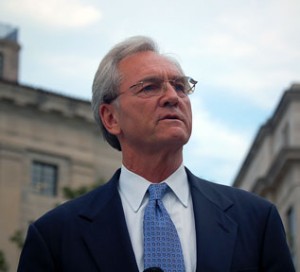When we were young and naive, back in the day before the Bush Years, we consumed the government and American history text books that told us how the judicial branch of government is supposed to be above politics. When I first set foot in a newsroom across the street from a courthouse in small town America, for a brief time I watched the system work that way. Even in the land of George Wallace.
The House is the most political of our national institutions. Representatives must run for reelection every two years. Senators used to be more likely to vote their conscience, at least on occasion, only facing the voters every six years.
Of course that was before the Great Partisan Divide descended upon our country like a pall, trapping us in constant gridlock. It’s unclear whether there’s such a thing as conscience in Congress anymore.
The presidency has always been about politics. That’s to be expected.
Back during the Reagan years, I first witnessed how the justice system could be corrupted for political purposes. Even the press in Alabama helped elect a corrupt Republican governor. The feds only confounded the corruption by hounding Birmingham’s first African-American mayor, trying and failing to prove he was corrupt.
I was the only reporter anywhere to really investigate this, until former New York Times reporter David Burnham came out with his book on how presidents from both parties had abused their power and corrupted justice for the sake of political power. Go back and read the chapter on Alabama in Above the Law: Secret Deals, Political Fixes and Other Misadventures of the U.S. Department of Justice. (I am named in the text, the index and the acknowledgements).
Our national naïveté may have begun to come to an end in the Reagan Years. We slid through the ‘90s on the excitement of the personal computer revolution and sensationalism gone mainstream on TV.
Then along came George W. Bush, Dick Cheney and Karl Rove, demanding a letter of resignation from every U.S. attorney in the country.
When Siegelman tried to win back the governorship in 2006 he lost in 2002 after a midnight computer vote scramble in Bay Minette, the small town where I got my start, the new Bush Justice Department and the Republicans could not have it. Since Siegelman was the only Democrat left in Alabama popular enough to have a chance of winning an election, they had to defeat him not at the ballot box, but instead by abusing the courts.
I was there for a couple of days ready to investigate the story for the New York Times. But they pulled me out when Siegelman conceded the election.
The Republicans failed in the first attempt to convict Siegelman in Birmingham. A federal judge threw out the charges. But then they got even more creative and came up with the idea to try him along with the unpopular Richard Scrushy of HealthSouth infamy, in Montgomery. What a show trial it was.
As a political strategy it totally worked. Siegelman can’t run for office. He’s serving his time. The Alabama Democratic Party is all but dead.
Then along came a new president, Barack Obama, promising to stop the political prosecutions and get back to the merit system instead of hiring U.S. attorneys as political spoils. The justice system is working better, apparently, with the possible exception of the right-slanted U.S. Supreme Court in a few extreme cases.
Except for one thing. Siegelman is still in prison, all but forgotten as a political prisoner doomed to obscurity and ruin. If he was pardoned, he could run for office again. Perhaps only he could bring back the Alabama Democratic Party.
President Obama came under fire in 2012 for not using his pardon power enough. With a little more than a year to go in office, people are wondering if he can find the will to do the right thing one more time before he goes back to his version of the ranch.
While a number of lawyers and bloggers have tried to get him to do the right thing, to no avail, let me make the case. Maybe we can get the president’s attention.
As I wrote back in the day when the Siegelman case still had legs, there are four main arguments why he should be freed.
One, there was no explicit proof of a quid pro quo for Siegelman’s appointment of Scrushy to the state hospital regulatory board. This exchange was supposedly for contributions of $500,000 to pay off the debt on an attempt to create an education-lottery in the state, a campaign which failed largely due to the flood of millions of dollars in competing gambling money coming into the state through Ralph Reed and the disgraced, convicted felon of a lobbyist, Jack Abramoff. None of the lottery-education money went into Siegelman’s pocket. The bank got all its money back. The people lost a chance at millions to improve public education.
Two, on the alleged bribery charges, the statute of limitations had actually run out. The timing of the so-called bribe was never spelled out in the original indictment. The Republican judge allowed the prosecution team to proceed anyway. It was a corrupt way to run a prosecution. It was politics, not justice.
Nobody even suggested that previous Republican governors should have been indicted for taking political contributions from Scrushy, appointing him to the same board.
Three, even if the president didn’t want to get into the weeds of the facts in the case, the trial itself was tainted by a clear and convincing case of juror misconduct that was ignored by the Bush-appointed federal judge. The very idea of jurors reading news coverage online and e-mailing each other about the case outside the jury deliberation room would be instant grounds for a mistrial in any honest court. It is clear that the judge and prosecution team in this case did not fully investigate the issue by examining computers and e-mail addresses used by jurors or by questioning the jury or U.S. marshals at length.
In an honest court, sitting above politics, this would have been grounds enough for a mistrial. Instead, the judge issued a dynamite charge to break the logjam of a hung jury, threatening to keep jury members away from their families “as long as it takes” to reach a unanimous verdict.
The president could grant a pardon on those grounds alone. But that’s not all.
Fourth, Judge Mark Fuller should not have sat in judgment in the case while he was in the defense contracting business with the federal government. This was a clear conflict of interest. Fuller is no longer a federal judge, having stepped down due to an investigation into the case of him beating his wife in an Atlanta hotel. The state and nation learned his true character then. Those of us who watched saw it live in court.
The case against Siegelman was clearly political. That’s not the purpose of courts, at least if we want to keep teaching high school and college kids that the judicial branch of government should stand above mere politics.
While President Obama has not done everything the liberals, progressives and independents who elected him hoped for, at least he tried, with little help from Congress. Most of what he accomplished he did with his executive pen. This should be an easy pardon to sign for a Constitutional law professor.
If you have his direct number, would you send him this message please — before it’s too late?
Glynn Wilson is an independent journalist and a free-lance writer who has worked for the New York Times. He covered the Siegelman case for The Locust Fork News-Journal and The Nation magazine and is now the editor and publisher of the New American Journal at NewAmericanJournal.Net.















Reader Supported News - No Paywall, Google Ads, Popup Ads, Sponsored Content or A.I. - Support American Journalism with GoFundMe
If Obama had any cajones, Don would be out of jail, and Rove would be in.
Sounds about right.